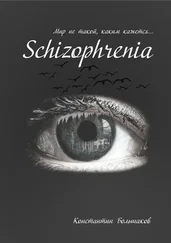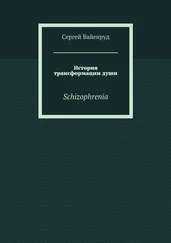1 ...8 9 10 12 13 14 ...20 A common misconception exists in our society, inspired by the meaning of the word schizophrenia, in which those who are suffering, like Mr. Ellerby, are confusedly described as having simply a “split personality,” what psychiatry termed “multiple personality disorder,” or more recently “dissociative identity diffusion (DID).” Some mistake those who are diagnosed with the disorder as versions of Robert Louis Stevenson’s characters in his 1886 novella The Strange Case of Dr. Jekyll and Mr. Hyde . And although the origin of the word schizophrenia does indeed come from the ancient Greek verb schizô , which means “to split, separate, dissociate,” the more accurate image of schizophrenia that corresponds with the experience of “losing one’s direction in life,” to quote Ellerby’s moving first-person account cited above, is rather that of “an orchestra without a conductor.” 4
The term schizophrenia emerged in twentieth-century Germany, when modern attempts to scientifically classify madness borrowed heavily from Greek dictionaries and created a series of neologisms (such as “phobia,” “manic-depressive psychosis,” or “paranoia”) to add to ancient concepts defining abnormal mental states and unusual behavior (such as “melancholia” or “mania”) the more generic notion of “madness.” The schism or split, inevitably suggested by the modern name schizophrenia, meant not to denote a split in two , but rather to express the tearing apart of the psychological functioning, a peculiar destruction of the cohesiveness of the self, a dissociation of the unity of the personality to a point of complete disintegration of one’s thoughts, emotions, and behavior.
Today, schizophrenia is a psychiatric diagnosis that is assigned mostly to individuals who suffer delusions, hallucinations, disorganized speech, and chaotic behavior, as well as diminished emotional expression, resulting in severe dysfunction in work, inter-personal relationships, and self-care. While naming the different symptomatic manifestations of what we call schizophrenia, we will refer to examples from experts by experience, such as Susan Weiner, whose first-person account conveys the experience of going mad. 5
The most common symptom of schizophrenia is having delusions. The particular false and fixed beliefs that persist despite all the evidence to the contrary and are associated with the diagnosis of schizophrenia are: (1) persecutory delusions : “This evil dictator (as I called him) pursued me down the highways of the United States … [with the] initial intent to possess the whole of my country, transforming it into a slave state”; 6(2) delusions of control , such as the belief that one’s thoughts or actions are being influenced and directed by external forces, accompanied by one’s feelings of loss of control: “This time, awful misogynist language broke into my consciousness. ‘Cunt,’ ‘Whore,’ and similar curses were like a bell in my brain … I was completely unprepared for such an onslaught … sometimes later I would believe people could read my mind”; 7and (3) delusions of reference , where an ordinary neutral perception is believed to have a special and personal meaning for the individual, typified in assertions such as “I began to believe that coded messages were held for me in signs, billboards, and advertising … I soon began to wonder if the TV and films held messages that I was supposed to follow too.” In addition, there are the (4) grandiose delusions : “In madness it was up to me to do my part in freeing the country from its stranglehold by a new and seemingly omnipotent potentate … I believe it was my duty to free each individual in the United States from the mental tyranny of the ‘evil dictator’”; “I was a spy! I had a heroic place in the hidden world of war that most people didn’t pay attention to”; (5) erotomanic delusions : “If something had a phallic shape I thought it was a romantic advance by hidden interlocutor”; (6) nihilistic delusions , exemplified by statements such as “I tried to face with courage experiences that felt like torture, with the spreading darkness that wanted to devour my nation and consumed its citizens”; and, finally, (7) somatic delusions that other sufferers conveyed such as “my heart is rotting.” 8
All of these latter mental phenomena are likewise seen as possible symptoms that call for a consideration of the schizophrenia diagnosis. Moreover, hallucinations that are typical of schizophrenia include the reported presence of negative and derogatory voices, as in “you are evil, you are a whore,” “you are the reason your brother is dead, you should die” or, for that matter, voices that command the individual to act in certain ways: “you should burn this house,” “you should jump off this bridge.” Lastly, they consist in hearing voices that presumably converse about the individual in question, so that the voice of X would say: “he is going to take the knife now,” followed by voice Y: “no, he isn’t, he is a coward.”
But beyond this list of symptoms, the most defining characteristic of an individual that would most likely be diagnosed as suffering from schizophrenia is the feeling that they provoke in the observer, of being incomprehensible and inaccessible.
Schizophrenia is considered by many to be the paradigmatic, “most troubling” form of madness, 9its “Far Side.” 10Most histories of this condition begin with Emil Kraepelin, the father of modern psychiatry, whose endeavor to classify mental illness in the late nineteenth century gave rise to the diagnosis of dementia praecox , the forerunner of the term schizophrenia. However, it seems that the “abnormal” kinds of behavior resembling those we have come to name schizophrenia were already identified, long before the term was first coined in the scholarly literature in 1911. Citing descriptions going back more than 3000 years (from Ancient Mesopotamia through fourteenth-century BCE Ancient India, fifth- and fourth-centuries BCE Ancient Greece and Rome, all the way to the Middle Ages and fifteenth- through seventeenth-century Europe), some scholars contend that the phenomenon that now goes by that name schizophrenia is “probably very old.” 11
In this chapter, we will see how texts written long before the term appeared can teach us about how extreme forms of “madness” were viewed throughout history, both by those who experienced it firsthand and those who observed it in others. Although writers of every epoch insist on the uniqueness of their interpretation of the phenomenon, two trends can be identified across this history: one that places madness at the extreme end of a spectrum that includes the norm, and another that views it as a distinct and categorical “other.” 12
Terms such as “madness,” “lunacy,” or “insanity,” together with descriptions of people who, in the eyes of their contemporaries, displayed disturbances in their habits and conduct that indicate the loss of a shared reality or common sense, can thus be used to write a history that predates the term schizophrenia. In other words, our story begins in the period well before the term schizophrenia was coined and its presumed “proper history” can be studied. The numerous (and often remarkable) ancient and medieval descriptions of the transformation of individuals who have “gone mad” show how previous eras dealt with the perennial difficulty of characterizing perceived deviant mentality and behavior, as being either at the extreme end of normal human experience or as a discrete form, to be diagnosed by experts and treated by specialists as isolated phenomena.
Yet, in studying the understanding of madness before modern psychiatry established the diagnosis of schizophrenia, we should avoid presentism and retrospective projections. Especially, we should not assume that “madness,” “madmen,” and “mad-doctors” (as they are described in these earlier texts) can be easily translated into the modern idioms of “schizophrenia,” “schizophrenics,” and “psychiatrists,” respectively. Instead, the meaning and interpretation, the explanation and understanding of madness, depend on how the term is understood in its different historical, geographical, cultural, theological, and philosophical contexts. We would even contend that what constitutes “mad” people is determined by themselves and/or according to their contemporary witnesses and experts.
Читать дальше












